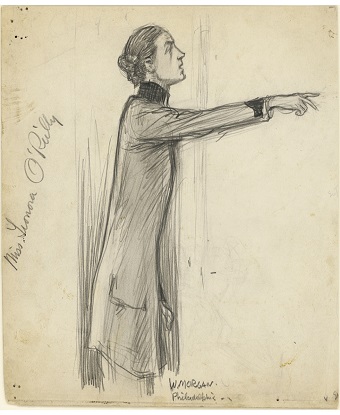Last updated: January 10, 2025
Person
Leonora O'Reilly

Wallace Morgan. National Portrait Gallery, Smithsonian Institution
A dynamic speaker and energetic union organizer, Leonora O’Reilly also made a significant contribution to the passage of women’s suffrage legislation at the state and federal levels. O’Reilly succeeded in forging ties between working-class women and their middle- and upper-class counterparts, sensing the potentially transformative nature of such alliances even as she critiqued more privileged allies for their insensitivity to the struggles faced by the poor and working-class.
O’Reilly was a leader in the settlement house movement and played an integral role in the creation and growth of the Women’s Trade Union League (WTUL), an organization dedicated to labor organizing and to legislative action. In 1911, she co-founded the Wage Earner’s Suffrage League in New York City, a dynamic organization aimed at engaging working women in the struggle for women’s enfranchisement.
Born in New York City on February 16, 1870 to Irish immigrant parents, O’Reilly began working in a garment factory at the age of eleven. There she experienced firsthand the harsh realities of industrial labor and the challenges faced by women in the workforce. While still a teenager, she joined the Knights of Labor, then the nation’s largest labor organization as well as one of the most open to welcoming female members. In 1886, O’Reilly joined the Working Women’s Society, a group that included both wage-earning women and middle-class reformers and advocated for higher pay, safer conditions, and shorter hours.
By the late 1890s, O’Reilly had established herself as one of the leading voices for the rights of female workers in New York City. She gave public speeches and advocated for reform legislation, all the while continuing to work in factories. O’Reilly also taught at an industrial school and worked in settlement houses during this period, even forming a short-lived cooperative shirtwaist sewing room.
In 1903, she co-founded the New York City Chapter of the WTUL. For over a decade, O’Reilly worked as an organizer and recruiter for the organization, receiving an annual annuity for her labor from 1909-1914. In 1909-1910, she served as a key activist for the WTUL during a large strike by shirtwaist workers in the city, organized by the International Ladies' Garment Workers' Union. The following year, she helped to organize protests in the wake of the devastating Triangle Shirtwaist Factory fire. The WTUL proved to be quite influential, though it received almost no support from the American Federal of Labor (AFL) or other male-dominated labor organizations.
O’Reilly was among the first female labor activists to publicly campaign for women’s suffrage. She attended meetings on the subject as early as 1900 and, between roughly 1907 and 1911, participated actively in the Equality League of Self-Supporting Women, an organization founded by Harriet Stanton Blatch. O’Reilly was vice-president in 1907 and on the board for several years thereafter. In 1911, she co-founded (along with Rose Schneiderman) a New York branch of the Wage Earners’ Suffrage League, which was created by and for working women. League activists regularly spoke in community settings and incorporated pro-suffrage messages as part of labor organizer campaigns. The League organized a large rally on April 22, 1912 at Cooper Union. All the speakers, including O’Reilly herself, had worked in the garment industry.
Throughout the 1910’s and early 1920s, O’Reilly continued to campaign for the rights of working women. She also became active in the anti-war and civil rights movements, joining the National Association for the Advancement of Colored People (NAACP) shortly after its creation. After suffering from heart disease for several years, Leonora O’Reilly died at the age of 57 on April 3, 1927.
Bibliography
Collens, Jacklyn. "Cultivating Solidarity: Leonora O'Reilly, Working-Class Women, and Middle-Class Allies in the American Woman Suffrage Movement." Masters thesis, Sarah Lawrence College, 2016.
McCarthy, Tara. Respectability and Reform: Irish American Women's Activism, 1880-1920. Syracuse University Press: Syracuse, NY, 2018.
Tax, Meredith. The Rising of the Women: Feminist Solidarity and Class Conflict, 1880 – 1917. New York: Monthly Review Press, 1980.
This project was made possible through the National Park Service by a grant from the National Park Foundation through generous support from the Mellon Foundation. The Mellon Humanities Postdoctoral Fellowship program is administered through a partnership between NPS, NPF, and American Conservation Experience.
